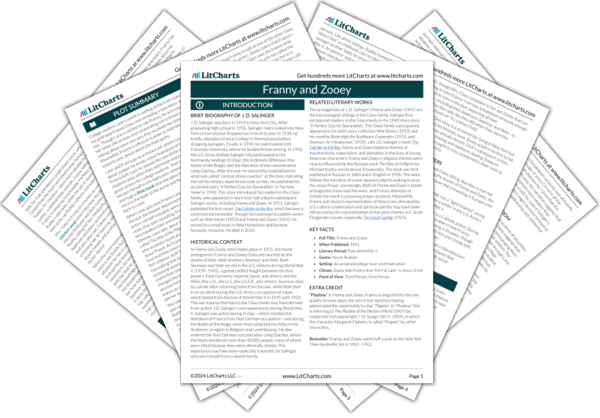In Franny and Zooey, Franny’s “little book”—eventually revealed to be the 1884 Russian religious work The Way of a Pilgrim—symbolizes the perils as well as the promises of seeking life wisdom from religious traditions. Franny is holding the little book at the narrative’s beginning when she disembarks from her train to meet her college boyfriend Lane Coutell. When Lane first asks her about the book, she dodges the question, quickly hiding it in her bag. Yet later, after Franny and Lane have a testy exchange over lunch at a restaurant, Franny flees to the restaurant bathroom, sobs, and takes the little book from her bag to hug it. When Franny embraces the little book while distressed at Lane, the narrative suggests that the little book gives Franny emotional or spiritual comfort—but that it may also be influencing Franny to be more combative and alienated than she might otherwise be. After Franny returns to her table with Lane, he eventually asks her about the book again. She explains, first hesitatingly and then enthusiastically, that it’s a narrative of religious instruction called The Way of A Pilgrim that tells the story of a Russian peasant learning to say the Jesus Prayer unceasingly. Despite Franny’s enthusiasm, Lane pays little attention while she talks and eventually dismisses religion as a mere psychological phenomenon—before changing the subject by proclaiming his love for Franny. Lane’s combined lack of interest in Franny’s spiritual life and nominal “love” for her seem to push Franny over the edge, as she faints shortly thereafter, beginning her nervous breakdown. Up to this point in the narrative, then, the little book seems to be both a potential source of real wisdom and an intellectual interest that alienates Franny from her more conventional boyfriend.
After Franny’s breakdown, she returns to her family’s Manhattan apartment, where her slightly older brother Zooey tells her that while he was attracted to The Way of A Pilgrim himself at her age, he thinks that she misunderstands the Jesus Prayer and that she is seeking to hoard spiritual wealth as a way to separate herself from inauthentic people she disdains. This criticism suggests not only that religious seeking can alienate seekers from more conventional people, but also that seeking religious wisdom can make one unpleasantly condescending or contemptuous toward conventional, secular, non-religious people. Yet Zooey ultimately also suggests to Franny that she should try seeing Jesus Christ in everyone, including the “phonies” she abhors. Thus, the novel implies that religious seeking is socially difficult but can be rewarding—as long as it doesn’t make the seeker cruel, condescending, or arrogant.
Little Book/The Way of a Pilgrim Quotes in Franny and Zooey
After a moment, she picked up the book, raised it chest-high, and pressed it to her—firmly, and quite briefly. Then she put it back into the handbag, stood up, and came out of the enclosure.
“But the thing is, the marvellous thing is, when you first start doing it, you don’t even have to have faith in what you’re doing. I mean even if you’re terribly embarrassed about the whole thing, it’s perfectly all right. I mean you’re not insulting anybody or anything. In other words, no one asks you to believe a single thing when you first start out.”
“All that stuff . . . I don’t think you leave any margin for the most elementary psychology. I mean I think all those religious experiences have a very obvious psychological background—you know what I mean . . . It’s interesting, though.”
I know the difference between a mystical story and a love story. I say that my current offering isn’t a mystical story, or a religiously mystifying story, at all. I say it’s a compound, or multiple, love story, pure and complicated.
“You don’t even have enough sense to drink when somebody brings you a cup of consecrated chicken soup—which is the only kind of chicken soup Bessie ever brings to anybody around this madhouse.”












